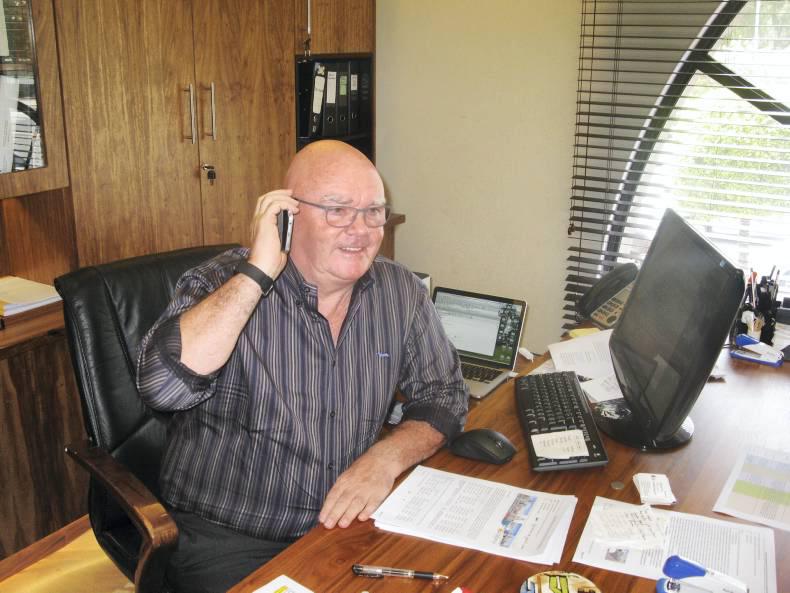A former Irish beef baron has become South Africa’s leading supplier of solar energy. Laois-born Paschal Phelan was known by his colleagues as the first person to get vacuum-packed Irish beef into Britain.
Today, he heads up the Phelan Energy Group based in Cape Town, South Africa. This group is promoting huge solar energy projects for electricity generation both locally and across the globe.
Paschal’s interest in solar energy was triggered when pylons carrying power from Johannesburg to Cape Town passed close to his farm in South Africa. Instead of protesting against pylons, he decided to exploit the fact that he was close to an electricity sub station by becoming an energy supplier. He initially looked at wind turbines but after a lot of internet research opted for solar energy.
And being Paschal Phelan, he never thought small.
The Phelan Energy Group was established in 2005, followed by the investment vehicle Solar Capital Renewable Energy in 2008.
When he was in the meat business, Paschal always strove for low costs and efficiency. He now describes his business as “the Ryanair of the solar power sector”.
Exploiting scale and technology and the collapse in the cost of solar panels, electricity produced by his solar power farms is now costing less than fossil fuel energy. South African electricity supplier Eskom has a massive deficit in power-generating capacity, with regular outages. The country is seeing exponential growth in solar energy, growth which Phelan predicts will continue.
Overall, the Irish-born entrepreneur told the Irish Farmers Journal that Phelan Energy and Solar Capital plus their management services have 36 solar farms up and going across South Africa and are working in nine countries worldwide.
A 200-megawatt (MW) solar energy project in De Aar in Northern Cape is described as the largest in the southern hemisphere, but even this is dwarfed by the one-gigawatt project goodwill which is planned for Jordan. This Jordanian investment is estimated at US$1.5bn but will deliver electricity 8c/kWh.
The earlier projects in which Phelan Energy was involved were financed 30% by investors and shareholders and 70% by banks including the World Bank. The German Deutsche Bank was and is frequently the lead lender/arranger but other global operators such as HSBC, Citi and Barclays are also partners or backers in the projects.
More recently, the financing balance has moved to 20% investors/shareholders and 80% banks. In other countries, Phelan can work with various partners including the state itself.
Solar farm
The average solar farm in South Africa covers about 300ha in panels and delivers 75MW and has a sub-station on site. The land is taken on a 50-year lease. The solar panels, which have dropped 90% in cost in the past five years, are guaranteed to deliver 80% efficiency after 25 years.
Overall, Paschal Phelan is budgeting for a five-year payback on the solar projects.
Solar energy is carbon footprint free, but like most of the alternative energy systems, it is handicapped by irregularity of supply.
On some South African solar farms, they are installing batteries so that surplus electricity generated in the middle of the day can be stored and fed back into the system during the 7.30am to 9.00am morning peak demand.
Paschal Phelan sees the development of battery back-up power storage as the next explosive development in solar energy, even if this doubles the cost of the projects. He is looking at a Taiwanese joint venture which would deliver a 24-hour power supply using the battery back-up.
Given the recent interest in solar power projects in Ireland, I asked Paschal Phelan if he would consider an Irish investment.
Unfortunately, he has been spoiled by the strength and dependability of the South African sunshine, which he reckons delivers four times the radiation which he could expect in Ireland. Irish solar energy will only survive with a huge subsidy tariff, is his conclusion.
Overall, however, he sees a brilliant future for solar energy globally and for his own involvement. He predicts that the exponential growth will continue as long as God delivers sunshine. “And being a good Irish Catholic, I believe that I have a direct line to himself to keep the show going” was his parting comment.
Paschal Phelan in Ireland
After four years in Australia, Paschal Phelan returned in late 1970s to join CBF (now Bord Bia), based in Europe.
After addressing a CBF international beef conference in 1980 on the future of vacuum packing, he was headhunted by Larry Goodman “almost before he left the platform”.
While running the boning halls in AIBP Cahir and Bagenalstown, Phelan pioneered the sales of vac pac beef to the Sainsbury’s Group in the UK.
After three years with Goodman, he struck out on his own and established Master Meats. Master Meats Ltd had a meteoric rise in the 1980s, with plants/boning halls in Bandon, Clonmel, Freshford and Ballymahon in the south, and Omagh and Aghohill in the North.
Paschal Phelan was to cross swords with Larry Goodman in an affair in which he took a High Court case against Goodman which eventually ended with a confidential settlement from Goodman. The row between the beef barons received national headlines in the mid-1990s in Ireland.
After a number of ventures including restaurants in New York and Chicago, outdoor pig farming in Ireland, hotels in Ireland (he sold the Lyrath Hotel in Kilkenny for £5m after buying it for less than £1m), he emigrated to South Africa, where he also invested in farms, a five-star hotel and other property before the solar energy venture.
For more information on the Irishman who is lighting up Africa, see www.phelanenergygroup.com.






 This is a subscriber-only article
This is a subscriber-only article





SHARING OPTIONS: